| Spotlight
Revolutionising Reading
Elita Karim
Photo: Zahedul I Khan
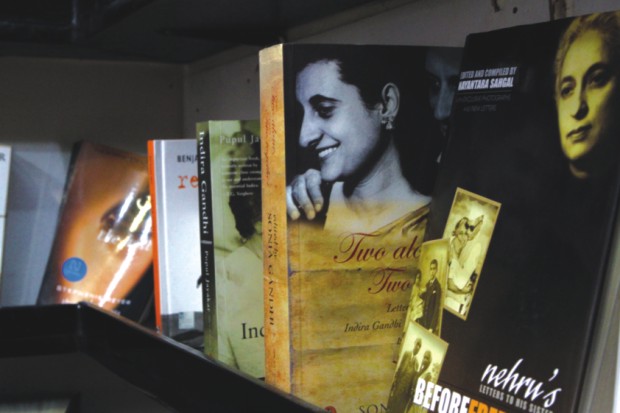
Suraiya Haque is a 21-year-old Computer Science student, studying in a private university in Dhaka. In between her hectic schedules involving midterms, weekly quizzes and the nerve-wrecking programmes that she has to work on, Suraiya manages a part-time job at a research company. Unlike other young people like Suraiya, she squanders almost every paisa she earns on books. An avid reader from a very young age, Suraiya dreams to own her own library one day and detests reading e-books online. “I go to Nilkhet almost every other weekend,” says Suraiya. “I have a couple of stores that I visit when I go there; I mostly buy science fictions, romance and also non-fictions.”
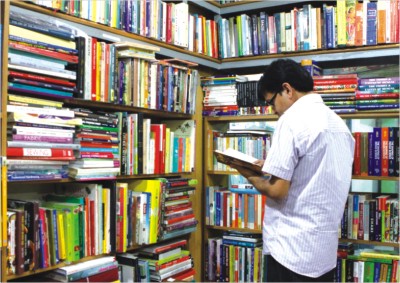 Popular for selling second-hand books at a cheap price, like Suraiya, readers of different ages and walks of life living in Dhaka city buy books from Nilkhet, a haven for book lovers. Unfortunately, however, many do not wonder why we don't get the latest original versions of foreign books like our counterpart readers living in our neighbouring countries. Popular for selling second-hand books at a cheap price, like Suraiya, readers of different ages and walks of life living in Dhaka city buy books from Nilkhet, a haven for book lovers. Unfortunately, however, many do not wonder why we don't get the latest original versions of foreign books like our counterpart readers living in our neighbouring countries.
Even though books are 'readily available' in Bangladesh, proper bookstores are either closing down or losing popularity amongst readers. J. K. Rowling's 'Harry Potter' series had created a hue and cry amongst youngsters all over the world. Readers in different countries would line up in front of bookstores to grab the latest copy of the books immediately after their launching and young readers in Bangladesh were not left behind either. Bookstores like Words n' Pages and Etc sold the 'Harry Potter' series like hotcakes for the first few days or so, until the series went through copy machines and found its way on the streets of Dhaka city and sold illegally. Similarly, Dan Brown's 'Da Vinci Code' and biographies of President Obama and other famous people were found everywhere. Readers could afford them, read them and even post reviews on them on blogs online. However, the books were all pirated and, (not) surprisingly enough, easily acknowledged by people buying them at the traffic signals, including members of the law enforcement.

One of the reasons why bookstores are closing down or are less in number in the city is because of the expensive tags that accompany the books, thanks to the imposition of a very high tax and VAT on the import of books into the country. “There should be no tax on import of books,” says Al Reiad, Senior Executive, Communications, Words n' Pages, a popular bookstore located in Gulshan 1.
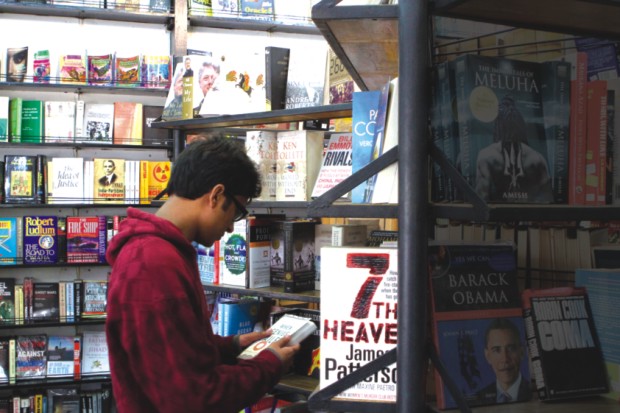
“Bangladesh and Srilanka are probably the only two countries where dealers have to pay taxes on the books that are brought in.” Reiad explains that the tax amount varies according to the types of books. “For instance, there is no tax on religious books and reference books, but we do have to pay a tax on cook books, fictions, non-fictions and so on. It goes up to at least 37 per cent.”
 According to a news report, at least 35 per cent tax, including 15 per cent direct tax, 3 per cent advance income tax and 4 per cent development surcharge, along with 1.5 per cent VAT are imposed by the National Board of Revenue (NBR) on books imported from abroad. This imposition has resulted in the local markets being flooded with pirated books. Piracy is one factor that most bookstore owners and dealers emphasise on, behind bookstores closing down. Piracy, a major factor behind fewer demands for books in the market, is also stimulated because of the high tax imposed on the import of foreign books. According to a news report, at least 35 per cent tax, including 15 per cent direct tax, 3 per cent advance income tax and 4 per cent development surcharge, along with 1.5 per cent VAT are imposed by the National Board of Revenue (NBR) on books imported from abroad. This imposition has resulted in the local markets being flooded with pirated books. Piracy is one factor that most bookstore owners and dealers emphasise on, behind bookstores closing down. Piracy, a major factor behind fewer demands for books in the market, is also stimulated because of the high tax imposed on the import of foreign books.
“Piracy is a huge problem but the government is not addressing it properly,” says AFM Shah Alam, former Vice President and current Director of the Bangladesh Book Publishers and Sellers Association (BBPSA). “In any case, readers belonging to middle class families in Bangladesh are not always able to afford foreign books. On top of that, the tax and the VAT add up to the cost making books absolutely expensive, as a result missing out on a good number of readers. If we could start a royalty system with the publishing houses abroad, I believe that some of the problems would be solved. In this case, there would be no question of paying a high tax price for the dealers as well.”
|
Youngsters love to have plenty of options around them to choose from. |
According to Al-Reiad, one other major reason behind the fall of bookstores is the demand which is very less as compared to the markets in foreign countries. This is one of the main reasons why dealers always have to depend on the Indian market to purchase books, instead of going directly to the mother companies in the United Kingdom.
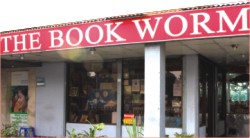 |
A popular bookstore in Dhaka city where readers like to buy orginal books. |
“To put matters simply, say a book costs around 10 pounds in the United Kingdom,” he explains. “The company in the UK would sell the same book at a discount price to dealers in India. Because there is a huge demand for books in India, dealers from India would be able to purchase copies of the book on a large scale from the UK. Thus, the same book would cost around 6 pounds in India. On the other hand, dealers in Bangladesh, while purchasing the same book from India would get a discount as well, but because of the tax imposition, by the time it would reach Bangladesh, the book would cost around 10 pounds.” If the demand for books was bigger in the country, dealers in Bangladesh would be able to contact the mother companies in the UK directly and purchase books at a discount. In fact, a larger readership would also encourage foreign publishing houses to invest in Bangladesh as well. This is one of the reasons why bookstores like ETC and Words n' Pages find it hard to keep up business in Dhaka. While ETC closed down, Words n' Pages had almost disappeared from the scene a few months back. “Things are changing now,” says Reiad. “We have returned to the scene once again and have new books to offer to our readers.”
Apurba Das says that even though he has bought a few books from the streets, he yearns to leaf through new books as soon as they hit the market. “Unfortunately, that is not possible in Bangladesh,” says the 41-year-old businessperson. “I buy books from foreign countries when I have to travel on business, but I believe that they should be readily available in Bangladesh as well. The government cannot take this matter lightly. It is not only a matter of stopping piracy in the country, but it is also giving the readers in a country an opportunity to get involved in culture exchange through books.”
However, it is not only the government, but also the readers themselves who have a very significant role to play where abolishing piracy is concerned. They need to be aware of what is wrong and right, hence encouraging a proper practice of appreciating creativity and hard work amongst the authorities as well. Areas like readership and music are far behind in Bangladesh when it comes to imparting and receiving knowledge, because both the listeners of music and readers of books have taken these extraordinary creations for granted. Unless they voice out against piracy, there will come a time when these creators will lose the spirit to create for their country people. As Franz Kafka had put it -- a book must be an ice-axe to break the seas frozen inside our soul.
For an Ideal Bookstore
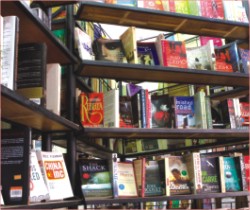 Not only do book lovers look for a good book to read right before bed or to while away the time spent on the bus or inside the CNG-run-autorickshaw in the middle of a maddening traffic jam, but they also look for cosy spots and pleasant areas to read, outside their homes. While mature readers prefer to have a sip of lemon tea with an interesting book, youngsters love to have plenty of options around them to choose from, starting from shelves filled with science fictions and fantasy tales to rows of encyclopaedias for school. In fact, most readers also look for a book store with access to the internet where they will be able to read quick reviews before buying the actual book from the stores. Not only do book lovers look for a good book to read right before bed or to while away the time spent on the bus or inside the CNG-run-autorickshaw in the middle of a maddening traffic jam, but they also look for cosy spots and pleasant areas to read, outside their homes. While mature readers prefer to have a sip of lemon tea with an interesting book, youngsters love to have plenty of options around them to choose from, starting from shelves filled with science fictions and fantasy tales to rows of encyclopaedias for school. In fact, most readers also look for a book store with access to the internet where they will be able to read quick reviews before buying the actual book from the stores.
|
Copyright (R) thedailystar.net 2010 |

